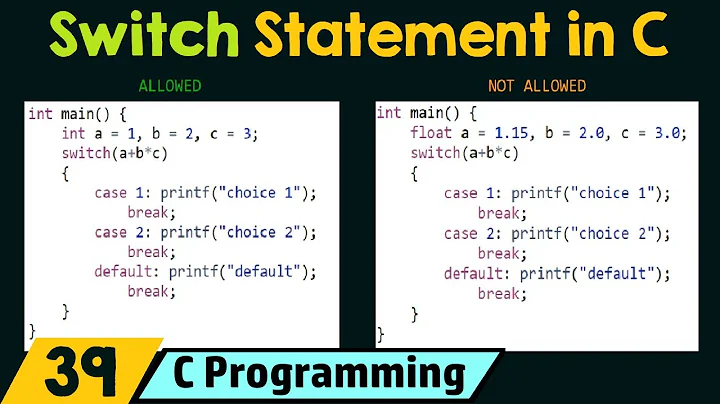How Switch case Statement Implemented or works internally?
Solution 1
It's actually up to the compiler how a switch statement is realized in code.
However, my understanding is that when it's suitable (that is, relatively dense cases), a jump table is used.
That would mean that something like:
switch(i) {
case 0: doZero(); break;
case 1: doOne();
case 2: doTwo(); break;
default: doDefault();
}
Would end up getting compiled to something like (horrible pseudo-assembler, but it should be clear, I hope).
load i into REG
compare REG to 2
if greater, jmp to DEFAULT
compare REG to 0
if less jmp to DEFAULT
jmp to table[REG]
data table
ZERO
ONE
TWO
end data
ZERO: call doZero
jmp END
ONE: call doOne
TWO: call doTwo
jmp END
DEFAULT: call doDefault
END:
If that's not the case, there are other possible implementations that allow for some extent of "better than a a sequence of conditionals".
Solution 2
How swtich is implemented depends on what values you have. For values that are close in range, the compiler will generally generate a jump table. If the values are far apart, it will generate a linked branch, using something like a binary search to find the right value.
The order of the switch statements as such doesn't matter, it will do the same thing whether you have the order in ascending, descending or random order - do what makes most sense with regard to what you want to do.
If nothing else, switch is usually a lot easier to read than an if-else sequence.
Solution 3
On some googling I found some interestin link and planned to post as an answer to my question. http://www.codeproject.com/Articles/100473/Something-You-May-Not-Know-About-the-Switch-Statem
Comments are welcome..
Related videos on Youtube
2vision2
Updated on June 03, 2022Comments
-
2vision2 almost 2 years
I read somewhere that the
switchstatement uses "Binary Search" or some sorting techniques to exactly choose the correct case and this increases its performance compared to else-if ladder.And also if we give the case in order does the switch work faster? is it so? Can you add your valuable suggestions on this?
We discussed here about the same and planned to post as a question.
-
 DCoder over 11 yearsDepends on the compiler and the actual switch cases. Some common implementations are demonstrated in Secrets of Reverse Engineering.
DCoder over 11 yearsDepends on the compiler and the actual switch cases. Some common implementations are demonstrated in Secrets of Reverse Engineering. -
PeterJ over 11 yearsThis would be very compiler specific. The limited times I've looked at assembler output most seem to just use jumps tables, I've never seen a binary search but would be plausible for an optimised compiler with enough case clauses where the expressions were spaced apart to make it worthwhile.
-
2vision2 over 11 years@PeterJ Say its a gcc compiler? any comments on it?
-
Reuben Morais over 11 yearsDuplicate of: stackoverflow.com/questions/2596320/…
-
PeterJ over 11 years@2vision2, not really, I've only looked at embedded processor output mainly. But this kind of search would only make sense of sparse case values, which I've never seen a lot of in practice.
-
 DCoder over 11 yearsMy personal experience with GCC is limited, and I can only point to one interesting example. Edit: of course, if you're curious, you should compile multiple different switch() statements and disassemble the results.
DCoder over 11 yearsMy personal experience with GCC is limited, and I can only point to one interesting example. Edit: of course, if you're curious, you should compile multiple different switch() statements and disassemble the results. -
2vision2 over 11 years@DCoder loks interesting.. Thanks..
-
2vision2 over 11 years
-
 DCoder over 11 yearsThat is a nice article, but again - the compiler is free to implement a switch however it wants - as a series of if/else, as a one-level or multi-level jump table, as a binary search pattern... the fact that MSVC implements them in a particular way does not guarantee that GCC, clang or ICC will do the same.
DCoder over 11 yearsThat is a nice article, but again - the compiler is free to implement a switch however it wants - as a series of if/else, as a one-level or multi-level jump table, as a binary search pattern... the fact that MSVC implements them in a particular way does not guarantee that GCC, clang or ICC will do the same. -
2vision2 over 11 years@DCoder I completely agree with you..
-
 Ciro Santilli OurBigBook.com almost 9 years@ReubenMorais disagree with duplicate because that was Visual C++ specific. If else vs switch is likely to answer this as well: stackoverflow.com/questions/97987/… is likely to answer this as well.
Ciro Santilli OurBigBook.com almost 9 years@ReubenMorais disagree with duplicate because that was Visual C++ specific. If else vs switch is likely to answer this as well: stackoverflow.com/questions/97987/… is likely to answer this as well.
-
-
Mats Petersson over 11 yearsYes, that's sort of what I tried to say - the compiler will build tables and use them to jump through. But it may also use compare/jump statements, and it will hybridize between the two if that leads to "better" code [all depending on what you define as better - someone may think that having 32KB of table to sort out a switch-statement is better than four jumps, because those jumps are bad to predict in the branch prediction in the processor, but someone else thinks it's ridiculous to have 32KB to solve this particular case]
-
 Dai over 4 yearsThe “use value as offset jump destination” trick doesn’t work for cases like
Dai over 4 yearsThe “use value as offset jump destination” trick doesn’t work for cases likeswitch( i ) { case 0: foo(); case 9999999: bar(); }otherwise it would massively add to the compiled program size. -
Vatine over 4 yearsYes, other possible implementations would be "a hash table of target addresses", "a few jump tables, with a bunch of if/then/else to get to the right table", etc. The exact form would depend on the exact code.
-
Mark Ransom almost 3 yearsI think you've captured the main point - a compiler doesn't have to be consistent about the code it emits for a
switchstatement, it can choose a strategy based on your actual conditions.










